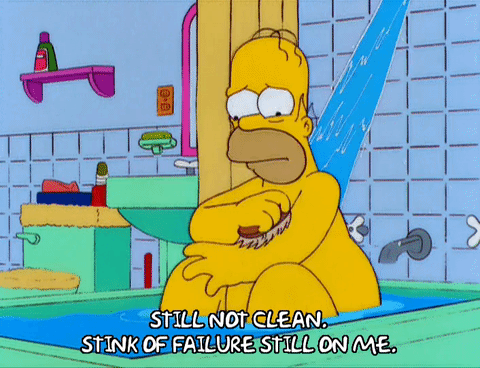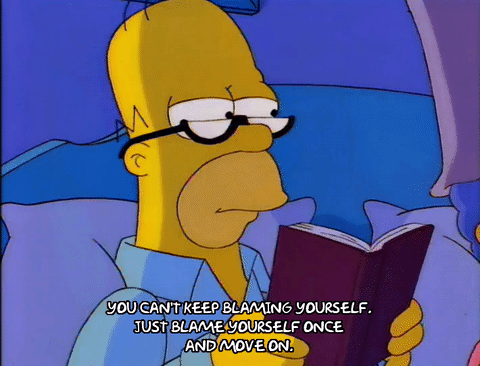Here we are... Week 8.
Eight weeks into the semester... Halfway through Fall of 2020... Here I am, still feeling as though I haven’t found my footing.
(Image description: A bedroom is shown as a rectangular prism. Depicted in back and gray are a bed, a rug, a plant, a door, and an individual sitting in a chair. Depicted in blue is water that fills up the bottom of the room and covers the bed, the rug, half of the plant, half of door, and most of the individual sitting in the chair.)
Time management is not my strongest skill (to put it gently), but I know that time management is paramount to getting things done while NOT losing a handle on everything else. As an undergrad and as a first-semester grad student, I planned, I scheduled, I color-coordinated, I over-planned, I broke large projects into smaller chunks, I set measurable goals, I gave myself personal deadlines...
This semester? I’ve struggled. I’ve managed to keep my head above water on most days, only ever being able to work a day or two ahead. I’ve hardly felt effective, productive, or generally satisfied with the work I produce (for my grad classes or my TA classes). Needless to say, it’s exhausting to feel disappointed in your work. It’s frustrating to continuously question your capabilities. It’s discouraging when you vow to do better, try harder, work smarter, figure SOMETHING out, only to find yourself gasping for air in a panic as the water level reaches your chin yet again.
That is not to say that I haven’t had good days. I have. That isn’t to say that I haven’t taken time away from my desk. Of course I have! You have to take time to attend to yourself as a person. Typically, though, I only take time to attend to myself when I’m at my absolute limit.
I haven’t struck a balance between school/work responsibilities and the personal responsibilities of attending to mental health, reaching out to family or friends, cooking, cleaning, exercising (what’s that?), and breathing.
Each week I make a resolve to make a plan and stick with it. Each week, a wrench of one form or another is thrown into the process and I take the easy way out: I let myself become frustrated with the process, frustrated with the situation, frustrated with "how I am."
It's so easy (for me) to be a defeatist, to resolve oneself to being insufficient, or to scoff at the often-toxic positivity that is thrown around with the best of intentions.
I recognize that I, Rebecca, have always grappled with boundaries: I say yes when I want to say no, I sacrifice my own needs to stress over other's, and I brush off the resulting expenditure of my limited mental/emotional energy.
Perhaps this is why I found myself somehow agreeing with a particular idea in Stanley Fish's Save The World On Your Own Time. For the uninitiated, Fish's argument is that you should only do your job, don't do anyone else's job, and don't let others do your job. Fish states that, “both the coherence and value of a task depend on its being distinctive,” (p. 168) and thus, the value of being a teacher is dependent on a distinct delineation of a teacher's obligations or responsibilities. By clearly determining what tasks for which you are responsible, you can easily determine the tasks for which you are not responsible and avoid using your time on tasks that are not within your role as teacher.
Of course, the list of Fish's EXTREMELY problematic and HIGHLY unrealistic views of pedagogy and education is somehow longer than my weekly to-do list. I do not have the time nor space in this blog post to discuss his opposition to education that aims to create engaged advocates, participants in democracy, or empathetic, critical thinkers. His views are in direct opposition with those of critical studies figures and his ideological commitments are in direct opposition with my own. Fish's educational philosophy starkly contrasts the educational philosophy of Paulo Freire, whose Pedagogy of the Oppressed has ranked #1 on my list of pedagogical readings so far.
While I strongly disagree with Fish's delineation of the obligations or responsibilities of a college teacher as well as the goals of education, I found myself tempted to buy into the practice of drawing hard lines and creating easy dichotomies. Perhaps, I thought, if I could just make a clear list of what tasks I must attend to as a teacher and what tasks I mustn't touch, then I could more easily manage my time and energy.
Of course, this is easier said than done. Part of Fish's argument is that the line is hard to draw unless you make the drawing of the line easy (read: embrace the role of oppressor / pre-ordained knowledge transmitter and follow the banking model of education).
It's easy to say, "As a teacher, I must be mindful of my hierarchal position in the classroom and attempt to enable students to combat their oppression in respectful, effective ways." This is much more difficult in practice. How can I feel as though I'm not sacrificing my ideological commitments when I must instruct students that there are objective, concrete, correct ways to use commas and ONLY those uses of commas make for True Good Writing™? I certainly can't tell a group of 3010 students (whose course objective is to learn how to write in the appropriate, scholarly, APA style) my thoughts on the ways in which the English language serves to reinforce and perpetuate ideas of colonization, patriarchy, racism, sexism, ablism, and straight-up oppression.
I find myself doing mental gymnastics to justify: Okay, so if the students can ever investigate the oppression of the English language and 'proper' sentence structure, they must start with an idea of what the 'proper' sentence structure is and why we are all urged to follow it. The students can effectively deconstruct the form once they know the form and its limitations... But... But I can't articulate all of this to them. We have such limited time! They need to know the requirements for the reference page. I still have to grade their papers from last week! I have to deduct points from their grade for uses of anthropomorphic language... Can I somehow explain that this rule only exists for the purpose of this class? After a semester of hammering anthropomorphic language out of their writing, will they later understand that objects and things can perform verbs because the symbolic has material effect? No, no, not now, not now... These issues are important but that is not my current job...right? My current job is to assist in the teaching of "how to follow writing rules and APA standards in order to synthesis disparate ideas and familiarize oneself with peer-reviewed journals centered around a communicative concept or theory." Someone else will do the important critical work... right?
Then, the clock shows a later hour and I have not made any progress toward grading their papers, creating the powerpoint for tomorrow's recitation meeting, or reading for my grad classes. Considerations of Freire versus Fish, my obligations versus my prohibitions, and co-intentional education versus banking-model education are IMPORTANT considerations. However, they do not always allow me to manage my time in the most effective way possible.
I now conclude this rambling blog post as I concluded my weekly Pedagogy discussion questions on Stanley Fish:
I feel as though I am left with two options: I could compartmentalize, delineate, and simplify the role or I could reject easy dichotomies, de-categorize meaning, maintain my own values in all areas of my life, and grapple. Grappling with content, with pedagogy, with boundaries and commitments... grappling with myself and with others in the pursuit of co-constructed knowledge seems, to me, a far better use of my time.
At the end of another week, I sit down with the intention of filling out my planner, setting personal deadlines, and creating attainable goals. I try to reconcile my limited abilities within the resources I currently have and the deeply personal, political, critical reasons that have lead me to even consider serving as a TA. Again, I list my action items:
- This weekend: Complete all reading/preparation for my grad classes
- Sunday: Complete grading as necessary in order to stay up-to-date with grades
- This week: Maintain boundaries with the amount of time I will dedicate to each TA class
- This week: Maintain boundaries of when I will respond to student emails
- This week: Build personal time AND buffer time into my schedule to ensure I don't burn out or break down
- This semester: Continue to grapple. Continue to breathe.
References:
Freire, P. (1970). Pedagogy of the oppressed. Bloomsbury
Fish, S. (2008). Save the world on your own time. Oxford University Press
@elif-demir (n.d.) Animation drowning gif [.gif image]. Retrieved from https://giphy.com/gifs/room-aquarium-drowning-tHVI8Za6XdG69KnAGZ



